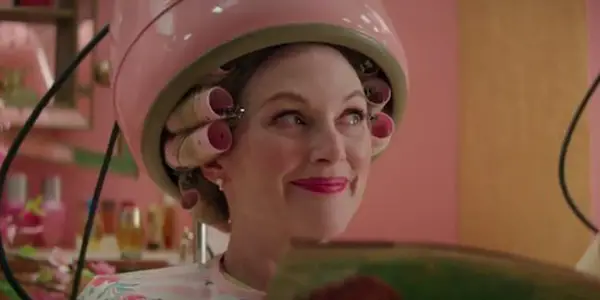A lost script from the ’80s by the Coen Brothers has found its way to the big screen, yet they’re not the ones behind the camera. George Clooney is the person taking a step behind the camera to explore this 1960’s seemingly peaceful white suburbia. However, just like the decade, Suburbicon is a film full of fake smiles and pretentious story-lines, that doesn’t always manage to draw you in.
Gardner Lodge (Matt Damon) and his son Nicky (Noah Jupe) have just suffered a terrible loss. After a couple of home invaders have killed Mr. Lodge’s wife (Julianne Moore), they must try to rebuild their lives. But as any seemingly perfect 1960s suburbia, dark secrets are ready to come out.
A Cup Of Sweet Tea With Extra Poison
Suburbicon is very much a Coen Brothers film being directed by someone else. It has the themes, the quirky, and the dark undercurrent of almost all of their films. For the most part, Clooney is successful in merging the dark ideas of the film in an eccentric style brilliantly. There’s plenty of body comedy and uncomfortable dialogue that is reminiscent of 1996’s Fargo and other Coen Brothers films.
Clooney fits this story of murder perfectly within the 1960s time frame. He brings the ’60s white peoples’ obsession with being the perfect American family to the forefront, shown through the town’s high pitch voices and fake smiles as they bake each other homecooked welcome presents. However, Clooney and the Coen Brothers are more interested when the meals go wrong or when their rose-colored glasses fall off.

And like any housewife in her kitchen, it’s here where Suburbicon is at its most comfortable, digging deeper and deeper into the secrets of our main white family and showcasing the length to which they will go to keep their perfect white picket fence lifestyle. Of course, it’s classic Coen Brothers exploring a small seemingly ideal neighborhood before very dark secrets are revealed. However, when it focuses on this aspect, it’s a solid film capable of entertaining you.
The Corpse In The Closet
Just like any 1960s family, that perfect facade will eventually disappear, and Suburbicon isn’t any different. Clooney wants to keep the ’60s aesthetic not only on screen but with the film’s construction. The various blackouts feel terribly out of place and some of the divisions don’t necessarily fit well, given the film’s tone. But it may be the 1960s inspired score that seems the most uninspired work. Shades of Psycho are sprinkled through the score which makes it feel very traditional and quite clichéd. It feels like an easy way to revisit the decade without trying too much.
As Clooney takes a liking to the era, he gets a little too absorbed. His decision to include a black family moving into a white neighborhood opens up a much-needed conversation about racial relationships and racial integration of the 1960s. I mean, it’s a real-life story, one that actually happened to the Myers’ family. However, Clooney decides to take a much different route, a more ’60s route if you may say, to his portrayal of minorities. The family is, for most of the film, silent and kept as a side story to the central white story. Even as Clooney juxtaposes both stories, they never truly connect in a meaningful way. Both story-lines are deserving of their own film, and of course, the white story-line gets the most attention.
A Message Stuck In The 60s
Though, Clooney and the Coen Brothers are definitely trying to say a meaningful message here. However, it’s a message better suited for the people living in Suburbicon than for a 21st-century movie-goer. As they show both stories, the message of white privilege and that white people can be bad people just doesn’t feel deep enough. If you’re anyone outside the Neo-nazi white supremacy group, the message has already been delivered. Suburbicon doesn’t go that one step further or develop the theme of white privilege beyond a 1960s understanding. It just doesn’t mirror our modern day racism like Get Out so perfectly did earlier this year.
However, Suburbicon opens a conversation of how minorities keep getting the short end of the stick in Hollywood. Their stories are kept sidelined and often; their stories don’t matter at all. Clooney and the Coen Brothers can hide all they want behind their excuse of staying faithful to the ’60s decade or the shallow message of the film. But it doesn’t change the fact that a story about the first black family to move into a white neighborhood deserves to be told in an empowering manner rather than being a supporting story for white characters.
Suburbicon: Conclusion
Even if Clooney goes overboard with the 1960s way, Suburbicon‘s main story remains fun and interesting. Its constant sidelining of its black characters dampens the film and never truly gets the potential that it could. But anyone who’s in love with the 1960s aesthetic will definitely get a kick out of the scenery and the set design. While I’m sad that it doesn’t bring the racial commentary to the forefront like it wants to, as a dark comedy about white suburbia, it’s solid. It’s only when the film starts silencing its black characters while trying to deliver a message about racial integration that it feels so self-defeating.
What are your thoughts on Suburbicon?
Suburbicon came out in theatres October 27.
Does content like this matter to you?
Become a Member and support film journalism. Unlock access to all of Film Inquiry`s great articles. Join a community of like-minded readers who are passionate about cinema - get access to our private members Network, give back to independent filmmakers, and more.